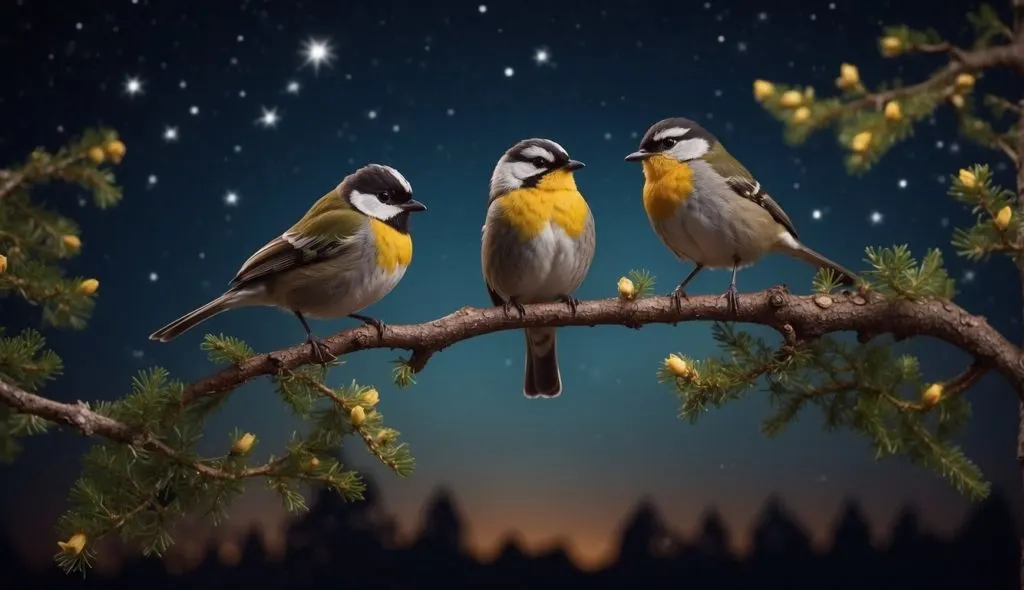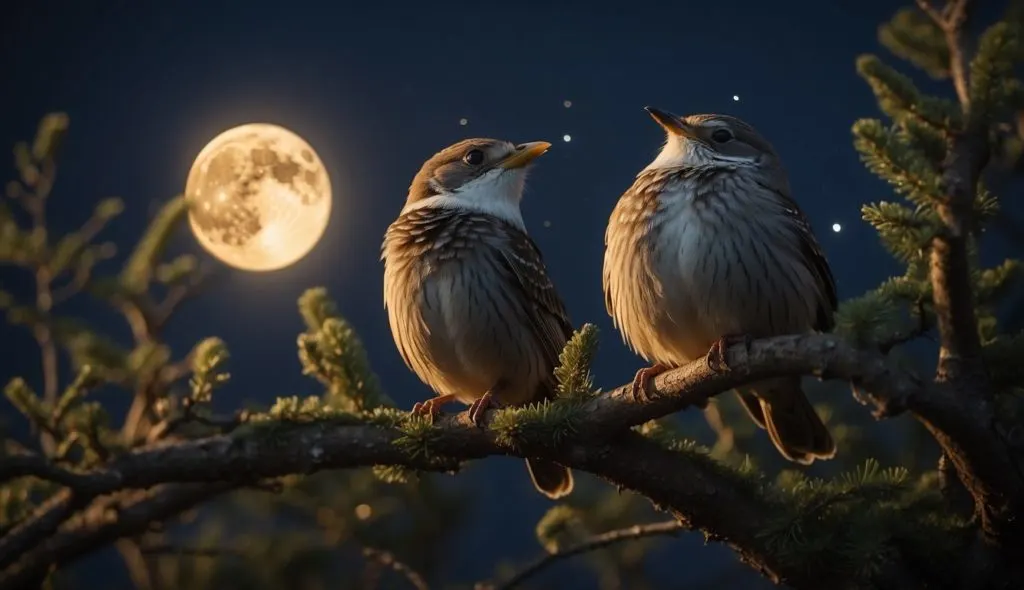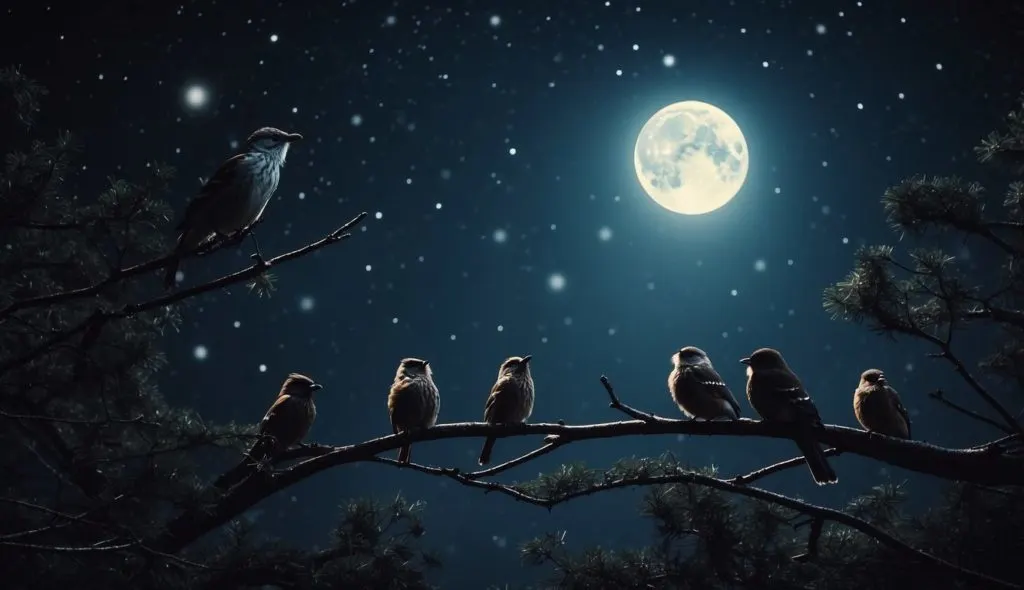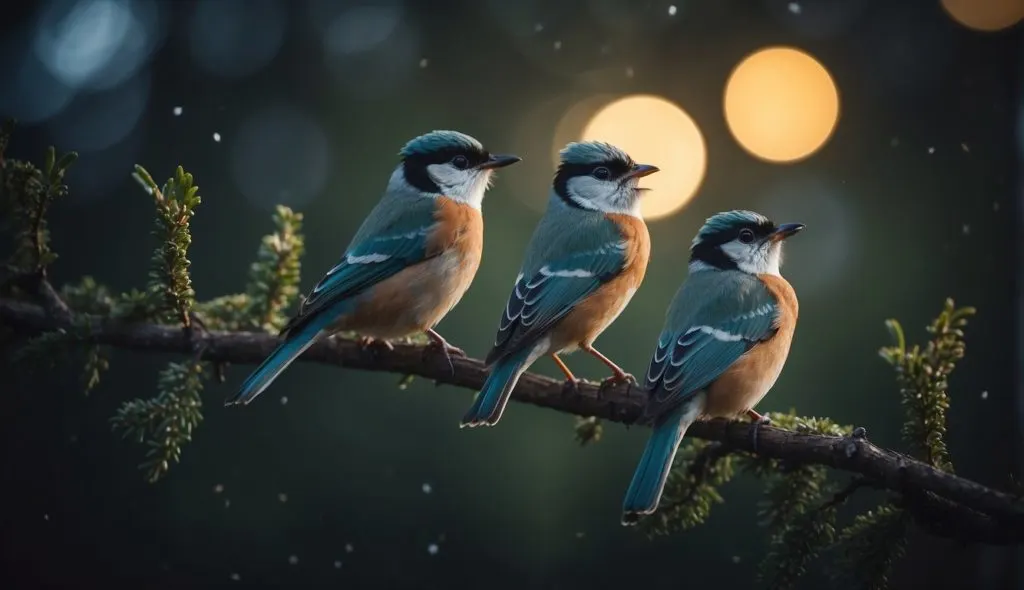Birds are known for their melodic chirps and songs during the day, yet you might have noticed that some species sing at night as well. This nocturnal singing can be particularly noticeable in urban areas where it often seems louder due to the reduced noise levels. The reasons for this behavior are varied and have been the subject of much scientific study. Let’s have a look at just who you might be hearing at night and why they’re vocal during darkness.

One reason birds sing at night is to claim and defend their territory. Without the visual cues available during the day, nocturnal song becomes a critical means of communication to signal ownership and prevent other birds from moving in. Additionally, the stillness of the night allows their calls to travel farther, reinforcing their territorial claims more effectively than during the bustle of daytime.
Another driver behind night song is mating. Male birds may sing to attract a mate or to demonstrate their vitality to potential mates. The relative quiet of the night makes their songs stand out more, increasing their chances of being heard by females.
Birds that are active at night, such as nightingales, are particularly known for their extensive and vocal nighttime courting.
The Phenomenon of Nocturnal Birdsong

Birds that sing at night engage in behaviors influenced by specific biological rhythms and species-specific traits. Understanding these factors sheds light on the adaptative purposes of nocturnal birdsong.
Biological Rhythms and Nocturnal Activity
Birds are regulated by circadian rhythms, which dictate their cycle of sleep and wakefulness. Some birds have adapted to be active at night, using sound to communicate.
Your ability to hear birdsong at night can be attributed to a handful of species well-adapted to the nocturnal lifestyle. Circadian rhythm disruptions, such as those caused by continuous urban illumination, can also prompt nocturnal singing in otherwise diurnal (daytime) birds.
Species-Specific Behaviors
Different bird species have distinct motivations for night-time singing. For instance:
- Nightjars and Owls: These birds are naturally nocturnal, using songs to claim territory or attract mates under the cover of darkness.
- Mockingbirds and Thrushes: Males of these species may sing at night during the breeding season to demonstrate fitness and deter rivals.
- Migratory Birds: Some birds sing at night while migrating to maintain flock cohesion and navigate.
Each species employs night-time singing as a survival strategy, whether to attract a mate without competition, to avoid predators, or to make the most of less contested night hours.
Environmental Influences on Nighttime Singing

Birds’ nocturnal singing is primarily influenced by environmental factors such as artificial lighting due to urban development and the pervasive presence of noise pollution.
Urbanization and Artificial Lighting
As you live in urban areas, you’ll notice that birds are more likely to sing at night. This is because artificial lighting from buildings, streetlights, and vehicles can mimic daylight conditions, leading birds to extend their singing into the night. (We live in the country and I can attest that it’s pretty quiet at night except for night birds like Chuck-will’s Widow and owls.)
Studies have shown that birds in cities often begin their dawn chorus earlier than their rural counterparts and may also sing at higher decibels to overcome the ambient light levels.
Noise Pollution and Its Effects
Noise pollution impacts birds similarly to artificial lighting. In bustling urban environments, daytime noise can drown out the songs of birds, which they use for attracting mates and asserting territory.
In response, some birds choose to sing at night when it’s quieter. Researchers have found that night singing is more common in areas with higher daytime noise levels, indicating that birds are adjusting their behavior to minimize the impact of human-generated noise on their communication.
Mating and Territory Defense
Birds often sing at night as part of their mating rituals and to assert their territorial boundaries.
Courtship and Attraction Strategies
When you listen to birds singing at night, you are often hearing males performing to attract mates. This behavior is crucial for species where females prefer males with the most elaborate or complex songs, as it directly influences their reproductive success.
Nocturnal singing can be especially effective because it stands out in the quieter night, making a male’s song more prominent to potential mates.
Territorial Announcements Outside Daylight Hours
Your territory, if you’re a bird, needs to be defended continuously, not just during the day. Singing at night helps maintain those boundaries by informing other birds that the territory is already occupied.
In urban areas, where artificial lighting is present, birds may extend their daylight hours, leading to increased nighttime song as part of their territory defense.
Predation Avoidance and Safety

Birds sing at night for various reasons, but a critical one is to avoid predators. During daylight hours, birds are more visible to predators. By singing at night, they reduce the risk of being spotted and thus hunted.
Predators rely on sight to locate their prey. By vocalizing in the dark, birds can communicate without revealing their location. This is particularly true for species like songbirds, whose predators are often diurnal.
Communication and Social Interactions
Birds utilize nighttime singing not only for mate attraction but also to maintain social bonds and facilitate group activities. These vocalizations play a crucial role in the day-to-day interactions of a bird community.
Group Cohesion Through Vocalization
When you hear birds singing at night, it is often a form of communication that reinforces group cohesion.
During the dark hours, visual cues are limited; hence, vocalizations become essential. Some species, such as parrots and owls, use soft calls to maintain contact with flock or family members, preventing isolation.
By using variations in their calls:
- Birds identify each other.
- They indicate their location.
- They reassure other group members of their presence.
These vocalization patterns ensure that the group stays together and supports each other in navigating the challenges of the nocturnal environment.
Role of Vocalization in Feeding
Vocalizations at night can be critical to inform or signal others about food sources. For some species, coordinated calls assist in foraging activities. An excellent example is:
| Species | Vocalization Purpose |
|---|---|
| Nocturnal swallows | Use calls to alert others about insect swarms. |
| Nightjars | Emit soft calls when a food source is located. |
In this way, vocalization acts as a tool for sharing information about food, ensuring that the entire group can take advantage of the resources available, which is especially vital when foraging at night.
Changes in Season and Weather Patterns
Birds’ singing behavior is closely linked to the time of year and prevailing weather conditions.
Seasonal Variation in Birdsong
Spring: You’ll notice that birds are most vocal during the breeding season, which typically begins in spring. Birds sing to attract mates and defend territories. The lengthening daylight triggers hormonal changes in birds, leading to increases in song output.
Fall: While spring is peak season, some species also sing in fall. In temperate zones, this may be related to a second breeding season or preparation for migration.
Impact of Weather on Bird Vocalization
Temperature and Rain: Birds are sensitive to temperature changes and rainfall. You may hear less bird song during extremes of temperature or heavy rain because these conditions can influence birds’ activity levels and behaviors.
Wind: Strong winds can affect the distance a bird’s song travels, leading to adjustments in vocalization patterns. On windy nights, some birds may choose to sing at lower frequencies to reduce sound degradation.
Research and Studies on Nocturnal Birdsong
Research on nocturnal birdsong is essential for understanding the behavior and ecology of birds that sing at night. This body of work increases knowledge of bird communication, breeding habits, and responses to environmental changes.
Techniques for Studying Nighttime Bird Vocalizations
Field Recordings: Researchers often use specialized audio equipment to record bird songs during the night. The recordings are analyzed using software to identify species, frequency of calls, and changes in vocalization patterns over time.
Spectrograms: These visual representations of sound frequencies assist scientists in analyzing the structure and complexity of bird songs. They permit detailed examination of each note and phrase, providing clues about the bird’s health, stress levels, and even its environment. (If you use Merlin, a great and free app from Cornell, you can identify bird songs by sound and will see a spectrogram of the song, too!)
Contributions of Citizen Science
Data Collection: Citizen scientists contribute valuable data by recording bird songs with smartphones and other accessible devices. Your observations can significantly expand the geographic scope of studies.
Species Monitoring: Your participation in online platforms like eBird allows for real-time monitoring of bird populations. By reporting nocturnal bird vocalizations, you contribute to databases that track species migration and behavior trends.
Frequently Asked Questions

Birds sing at night for various biological and environmental reasons. Each species may have distinct motivations for their nocturnal melodies, and seasonal changes also play a role.
What causes birds to sing during nighttime hours?
You may hear birds chirping at night due to reasons like territorial claims, attracting mates, or because artificial lights have disrupted their natural behavior, making them more active after dark.
How does the season, like winter, affect nocturnal bird singing?
In winter, birds may sing at night to establish territories before the breeding season or adapt to the quieter environment to make their calls more audible, as there’s less ambient noise.
What reasons do birds have for starting to sing before dawn?
The period before dawn, known as the dawn chorus, is when birds are most vocal to showcase their strength to potential mates and to assert their territory when other birds are listening.
Could nighttime bird vocalizations be an indicator of a bad omen?
While some cultures might associate night chirps with bad omens, there is no scientific evidence to support this; birds sing at night for practical reasons that are part of their natural behavior.
- Does Bird Seed Expire? - May 11, 2024
- How Big Are Baby Hummingbirds? - May 5, 2024
- How to Prevent Mold in Hummingbird Feeder - May 2, 2024
